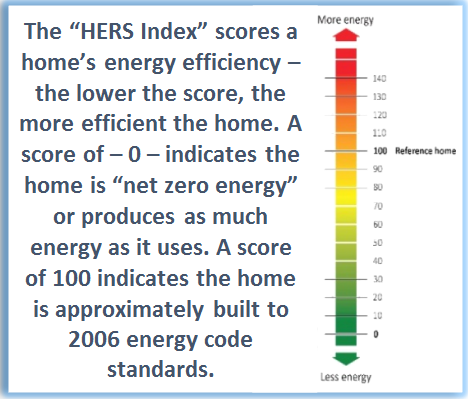

Guide to Appraisals
Appraised Value and Energy Efficiency: Getting it Right
While location, design, and price are a home buyer’s main considerations, surveys show that buyers rank energy efficiency as one of the most desirable features, and importantly, when there is sufficient energy savings - one they’re willing to pay more for. However, energy efficiency can be overlooked in the appraisal and/or listing process for a variety of reasons, including a lack of access to data, underwriting impediments, and appraiser or agent qualifications. Many appraisers and/or agents may not be aware of the unique features or benefits of an energy efficient home. However, many appraisers and real estate agents are qualified to identify these features that are often hidden behind drywall. One way to peg the efficiency of a home is to know which energy code it was built to, or ask the homeowner if the home has earned an energy or green certification. A quick address search of the RESNET HERS Index database is a good place to start. If rated July 2012 or later, the RESNET registry will reveal the home’s HERS Index.

According to the U.S. Department of Energy, homes built to the 2012 or 2015 International Energy Conservation Code (IECC) are 15-16% more efficient than those built to the 2009. They will typically be more comfortable to live in, have better overall performance, and lower monthly energy bills.
Fannie Mae, Freddie Mac and FHA require appraisers to consider the energy efficient features of the home, and if the market supports an adjustment in the appraised value, one must be made. Often, appraisers won’t take energy efficient and green features into account if they aren’t aware of them. This is where the listing agent must be sure that such features are accurately identified in searchable MLS fields and appropriate documents attached for potential buyers and appraisers to review.
A ready-made solution exists
Fannie Mae, Freddie Mac and FHA require lenders to choose appraisers who have the requisite knowledge required to perform a professional quality appraisal for the specific geographic location and/or who are competent to appraise a particular property type. The Uniform Standards of Professional Appraisal Practice (USPAP) promulgated by the Appraisal Standards Board (ASB) of The Appraisal Foundation defines “competence” requirements for appraisers where USPAP is applicable.
Appraisers who are qualified to appraise energy efficient / high-performing homes will analyze market trends relating to special energy-efficiency features. You can access a list of appraisers who have successfully completed the Appraisal Institute professional development program on the valuation of sustainable buildings, which can help lead you to a qualified appraiser for your specific property, at the Valuation of Sustainable Buildings Professional Development Program Registry.
What can agents do?
- Encourage sellers to complete the AI Residential Green and Energy Efficient Addendum form. The builder or energy rater probably is the best informed to complete the Addendum; therefore, seek their assistance to assure accuracy.
- Provide a copy of a complete Home Energy Rating System (HERS) report (if available). If home has solar photovoltaic (PV) system, review the U.S. Department of Energy’s informational guide addressing solar PV.
- Prepare the buyer to notify the lender that they require a qualified appraiser for this special type of construction; add your logo and provide a copy of the Directions for Buyers.
- Add your logo, the property address, and contact info to the Lender Letter along with any other special features or information regarding the property type. Instruct the buyer or their agent to give the letter (along with #1 and 2 above) to their lender.
What are the obligations of Real Estate Professionals?
As homes are listed with an increasing number of energy efficient features in MLSs around the country, it is important for real estate professionals to both understand the benefits provided by such features, and know how to best communicate with clients about efficiency. Once they understand the impact that efficiency upgrades can have on new or existing homes, real estate professionals can advise and refer clients to additional actions they can take to further impact home performance.
REALTORS® have an obligation under Article Eleven of the Code of Ethics that they shall not “undertake to provide professional services concerning a type of property or service that is outside their field of competence unless they engage the assistance of one who is competent on such types of property or service, or unless the facts are fully disclosed to the client.”
The National Association of REALTORS® offers NAR’s Green Designation program to those agents interested in high performance, resource efficient homes. Agents with this special designation are better prepared to serve the public on issues of energy efficient and green properties.
Additional resources
Ready-made directions for buyers (PDF)
